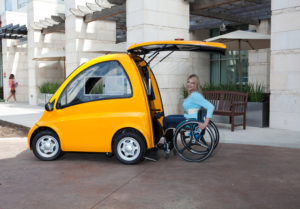To Save the Americans With Disabilities Act—Use THESE Talking Points!
Under the guise of protecting small business from frivolous lawsuits, the House of Representatives just gutted the Americans With Disabilities Act—a major piece of civil rights legislation signed by George H.W. Bush. I have to say, I’m on a LOT of small business discussion boards, and I haven’t heard any business owners screaming about hardship. Small businesses in pre-ADA buildings are exempt unless they do major renovations.

It’s up to us to make sure the Senate doesn’t follow along. Contact your Senators and let them know this is a vote where you will hold them accountable. And if your Rep was one who voted Aye, give them a piece of your mind too.
Of course, we’ll be tempted to argue on the basis of compassion. But remember who we’re dealing with here. These people have a long history of NOT acting out of compassion, often of doing the opposite. So compassion arguments “ain’t gonna cut it.” We have to get to them on the things they will listen to: costs to taxpayers, personal hardship to them, and of course, voting and campaigning for and donating to their opponents.
For 15 years, I’ve been making the dollars-and-sense business case for going green and building social entrepreneurship into business, which means I have some experience discussing issues with people who are predisposed to oppose my position. So let me offer some talking points I think they’ll actually listen to:
- Don’t Waste My Tax Dollars: How dare you make it harder for productive citizens to work, just because they have disabilities. If you think I want my tax dollars squandered on welfare payments to people who could have had a job until you made it impossible to get to work, you’d better think again.
- Don’t Hurt the Economy by Hurting Disabled People: For new construction, it’s really easy to design in ADA compliance from the ground up. By allowing builders to take shortcuts because you took away the teeth of this legislation, you’re encouraging them to stop designing in ramps and wider doorways, setting aside parking, making elevators disabled-friendly, etc have you noticed how many people with disabilities who in pre-ADA days had to sit home and be a burden have gone on to start job-creating companies making our economy better (like the personal-transportation vehicle for wheelchair users in the photo—designed by a wheelchair-using Texas woman)? There’s even an organization of disabled business owners that was named one of President George H.W. Bush’s 1000 Points of Light. Do you really want the blame for squashing that on your shoulders?
- Protect Our Veterans: Do you realize that veterans have much higher disability rates than the general population (due to war wounds), and that many have a hard time finding work and frequently start their own businesses? Thus, many of these job creators are veterans.You are hurting the people who served our country and defended our freedom.
- Pointless Government Meddling: The ADA has been around since 1990. Most public buildings are already accessible. This is bringing in the government to break a system that’s working just fine right now, and that has enabled millions of people to be productive members of society. And if buildings are allowed to come online without meeting current ADA code, it will be expensive to retrofit them later, when (not if) this weakening of the law is repealed.
- Personal Inconvenience to the Senator (this one takes a wee bit of research): I noticed that [name a family member of theirs with a disability] uses a wheelchair [cane, walker, seeing-eye dog, whatever]. Do you really want to be called away from important Senate business every time [name]has to go to the bank? How do you think I’m going to feel as a [business owner, manager, productive employee supporting my family] if I have to leave work to help my Aunt Mary do things she could have done for herself until you put obstacles in her way? And what’s going to happen to you, 20 years from now, when you may not be able-bodied yourself?
- Vote No or You’ll Organize to Defeat the Senator During the Next Election: Don’t just pledge to vote for your Senator’s opponent. Say you’ll be willing to campaign and fundraise for someone who understands that disability rights are important. If you’ve voted, donated, or volunteered for your Senator in the past, be sure to let them know.
